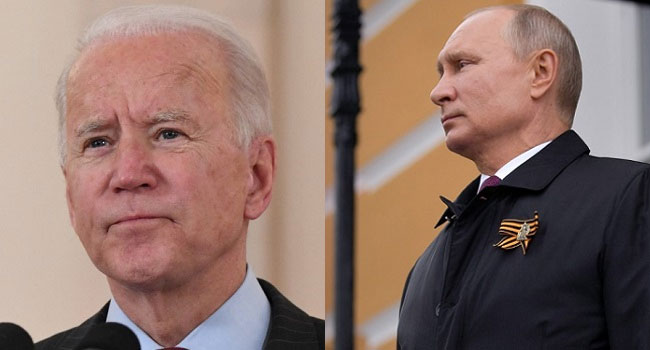Russia Bans Several US Officials As Tensions Escalate

![]()
Russia on Friday banned top officials from US President Joe Biden’s administration from entering the country as it announced a wave of tit-for-tat sanctions and expulsions of diplomats, as tensions soar between the rivals.
Moscow nonetheless said it viewed the prospect of a summit between Biden and Russian President Vladimir Putin “positively.”
On Thursday, Washington had announced sanctions and the expulsion of 10 Russian diplomats in retaliation for what it says is interference by the Kremlin in US elections, a massive cyber attack and other hostile activity.
READ ALSO: US Announces Sanctions Against Moscow, Expels 10 Russian Diplomats
Moscow issued a forceful response Friday, announcing that top US officials including Attorney General Merrick Garland, Biden’s chief Domestic Policy Advisor Susan Rice, and FBI chief Christopher Wray would be banned from entering Russia.
Earlier Friday Foreign Minister Sergei Lavrov told reporters that Russia was responding to US sanctions in “a tit-for-tat manner” by asking ten US diplomats in Russia to leave the country while also expelling five Polish diplomats in response to a similar move by Warsaw.
Lavrov also said that Putin’s top foreign policy aide, Yury Ushakov, had recommended that US envoy John Sullivan leave for Washington to conduct “serious consultations.”
But Russia’s foreign ministry insisted that it viewed Biden’s proposal to hold a summit with Putin “positively”, adding that it was “currently under consideration”.
Biden’s offer earlier this week of a summit had amounted to a peace offering, as tensions between Russia and the West have escalated over the conflict in Ukraine and the new penalties levied by Washington.
The US penalties widened restrictions on US banks trading in Russian government debt and sanctioned 32 individuals accused of meddling in the 2020 US presidential vote.
Normalising ties
Biden had on Thursday described the new US sanctions against Russia as a “measured and proportionate” response.
In March, Russia recalled its ambassador to the United States back to Moscow for consultations on the future of US-Russia ties.
The rare move came after Biden said Putin would “pay a price” for alleged election-meddling and agreed with the assessment that Putin is a “killer”.
Kremlin spokesman Dmitry Peskov on Friday said Putin had long talked about the importance of normalising relations between Moscow and Washington.
“It is indeed good that the points of view of the two heads of state coincide on this,” he said.
But Peskov also blasted the new round of penalties imposed by Washington, saying America’s “addiction to sanctions remains unacceptable.”
The Kremlin spokesman noted that Putin had last month had suggested that he and Biden hold virtual talks, which did not materialise as Washington did not respond.
Finnish President Sauli Niinisto on Friday offered his country as a venue for a possible Biden-Putin meeting.
Earlier this week Niinisto said he and Putin had spoken and the two discussed “the planned meeting” with Biden.
In recent weeks, Russia’s massing of troops on Ukraine’s northern and eastern borders, and on the Crimean peninsula it annexed seven years ago, have contributed to the sharp escalation in tensions.
US forces in Europe have raised their alert status in response, while NATO has issued warnings to Moscow.
Sanctions relief
Analysts say that even though the US sanctions against Russia were the toughest in several years, they do not pose a threat to the Kremlin.
“The Russian market felt some relief,” the Renaissance Capital investment bank said in an analyst note Friday, because the sanctions were “moderate”.
Sanctions as a tool for punishing Moscow have become routine since 2014, when Russia annexed Crimea and fighting erupted between Kiev’s forces and pro-Russia separatists in eastern Ukraine.
Relations have plunged further more recently, with Washington accusing Moscow of interfering in its presidential elections in 2016 and 2020.
This year even before the recent alarm over the Ukraine conflict, tensions had ratcheted up sharply after the US slapped sanctions on Russia over the poisoning of jailed Kremlin critic Alexei Navalny.
Ties then hit rock bottom last month after Biden, who promised to take a firmer line on Moscow than his predecessor Donald Trump, agreed with a description of Putin as a “killer”.
AFP


